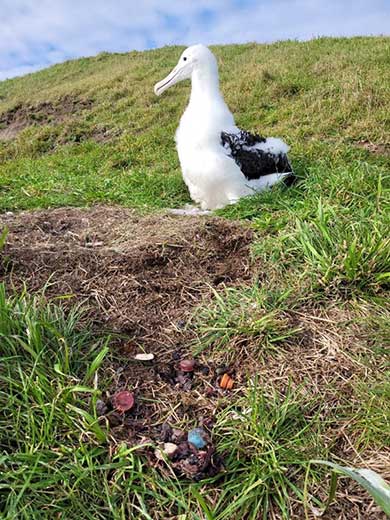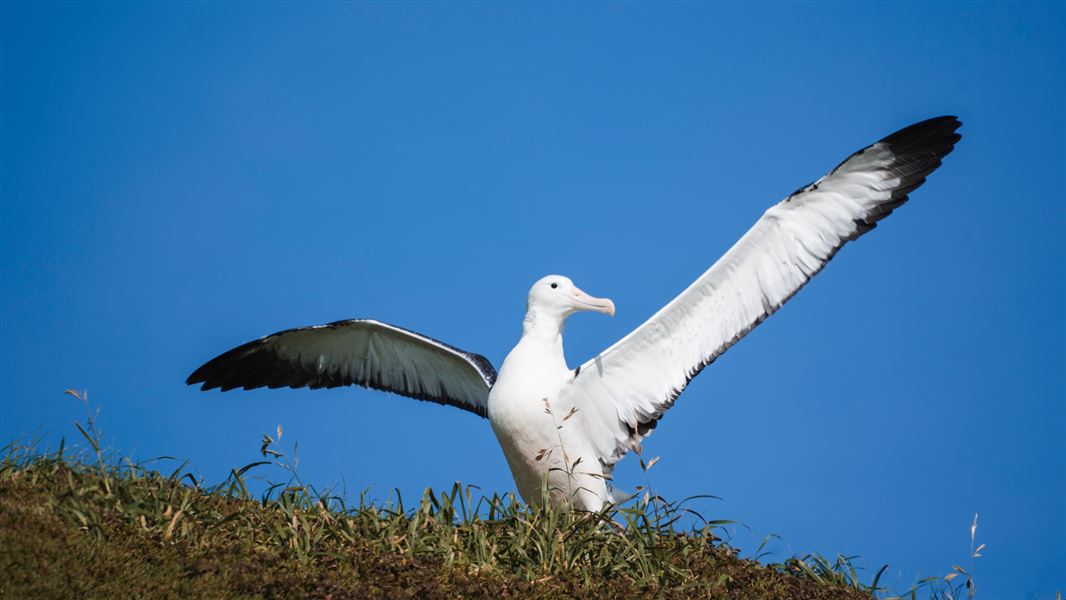Archived content: This media release was accurate on the date of publication.
Date: 28 August 2023
DOC Dunedin ranger Sharyn Broni says the male is the youngest on record to fledge, taking flight on Sunday — just 217 days after he hatched. He will spend the next 4-10 years at sea before returning to the colony.
“The previous record for youngest fledgling was 219 days and the average is 240 days. We think he fledged so early because he had really regular feeding from his parents, meaning he was in good condition and at a good weight, and perfect fledging conditions on Sunday with strong winds blowing him straight out to the ocean.
“The chick is one of 20 which has been fitted with a tracker that will record his movements for about the next three years. Previously the species has only been tracked for up to one year, so we’re excited to learn more about what these juveniles do in their first few years.”
The trackers do not transmit the bird’s location but save the data on the unit, which will be retrieved when they return to the colony.
He is the first fledgling of 33 toroa chicks at the colony this season. If all fledge successfully it will be the highest number on record to do so in a season. The current best is 30 chicks in 2021.
That includes the Royal Cam chick, Manaaki, who has been the focus of the popular 24-hour online live stream, run in partnership with Cornell University’s Lab of Ornithology in New York. Manaaki has been stretching his wings in the breeze but is not quite ready to begin his journey.
Sharyn says it’s been a very successful breeding season at the colony so far, though it has had its eventful moments.
“One major event was a female going to the Dunedin Wildlife hospital with acute liver failure near the end of the guard stage, which is the first 30-40 days when parents stay with their chicks to protect them.
“Remarkably she pulled through after a two week stay in hospital — a first for a breeding toroa — and is back successfully raising her chick.”

Regurgitated plastic next to an albatross nest at Pukekura colony
Image: DOC
However, one unfortunate trend that’s been observed is parents returning to feed their chicks with plastic in their stomachs, which is then regurgitated for the chick, says Sharyn Broni.
“Plastic is a serious threat for albatross. It can look like food when it’s floating in the ocean so the birds often catch it, which is a choking hazard for both parents and chicks. It can also fill up their stomachs which causes the birds to effectively starve, as plastic has no nutritional value.
“Easy ways you can help albatross and other seabirds include picking up rubbish when you’re at the beach or near waterways, reducing your plastic use where possible, and carefully disposing of any plastic you do use.”
Te Poari o Pukekura chair Nadia Wesley-Smith says, “It’s always pleasing to hear of a successful fledging, and this one beating the record for earliest recorded fledging shows the importance of regular feedings from parents and how that impacts the overall population of toroa at Pukekura. With the tracker attached, we’ll also look forward to gaining new insights on their activity during the years spent away from the headland”.
Otago Peninsula Trust and Royal Albatross Centre Ecotourism Manager Hoani Langsbury says, “As a father myself, I always think of the first chick to fledge as heralding in the empty nest concept as the birds start their big OE. This is both a sad and exciting time for staff. We’re looking forward to the first returners for next season.”
Background information
Toroa/northern royal albatross are one of the largest seabirds in the world, with wingspans up to 3 m. They are a vulnerable species that has been affected by changes to habitat and climate and by some fishing practices.
They also reproduce slowly, with breeding pairs typically raising a chick once every two years.
The colony at Pukekura/Taiaroa Head is the only mainland site in the world where toroa/northern royal albatross breed.
A taonga species, toroa have a conservation status of ‘Nationally Vulnerable’, with an estimated population of about 17,000 mature individuals.
The Royal Cam livestream is run in partnership with Cornell University’s Lab of Ornithology in New York, helping the lives of these albatross reach an international audience. Each year it receives millions of views from people all around the globe.
This season’s chick hatched 20 January 2023 from an egg laid 4November 2022. He’s being raised by parents L (female) and GLY (male) who are featuring on Royal Cam for the first time this season.
Contact
For media enquiries contact:
Email: media@doc.govt.nz
